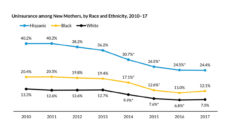Marriage equality brought new benefits to many same-sex couples including hospital visitation rights, tax benefits, and employer-sponsored insurance coverage. Employer-sponsored insurance remains the primary way people in the US receive health coverage, either directly or as a spouse or other dependent. Before same-sex marriage was legal, employer-sponsored insurance coverage was 6–15% lower for people in same-sex relationships compared to people in heterosexual relationships. This disparity was especially stark for same-sex couples of color. Almost 80% White women in opposite-sex marriages had insurance through their or their spouse’s employer compared 55% of Black women in same-sex relationships.
Millions of adults gained employer-sponsored coverage after marriage equality recognition because of an increase in dependent coverage for same-sex partners. Despite major gains, LGBQ people are still twice as likely to be uninsured than their straight peers. Much of the high uninsurance rate among LGBQ people is due to their increased risk of living in poverty, but some is due to legal insurance discrimination.
Employers that offer employer-sponsored insurance do not have to cover same-sex spouses. Obergefell v. Hodges, the Supreme Court case that compelled all states to grant same-sex couples marriage licenses, did not dictate the business of private corporations. Thirteen states prohibit insurance discrimination based on sexual orientation and gender identity, but all other states leave it up to the employer. A year after Obergefell was decided, less than half of employers that provided spousal benefits guaranteed coverage for same-sex spouses. In 2018, 63% of companies guaranteed equal benefits for same-sex and opposite-sex spouses. About 6% explicitly would not cover same-sex spouses, and the remaining 31% have never encountered a client whose same-sex spouse wanted to be covered under their benefits.
Sexual minorities tend to delay care because of cost, and improved access to health insurance is necessary to reduce these delays. Federal nondiscrimination legislation is a stepping stone to closing up insurance loopholes and providing equitable healthcare access to the LGBTQ community.
Databyte via Lindsey Dawson, Jennifer Kates, and Matthew Rae. “Access to Employer-Sponsored Health Coverage for Same-Sex Spouses: 2018 Update.” Kaiser Family Foundation. 29 Oct. 2018.














